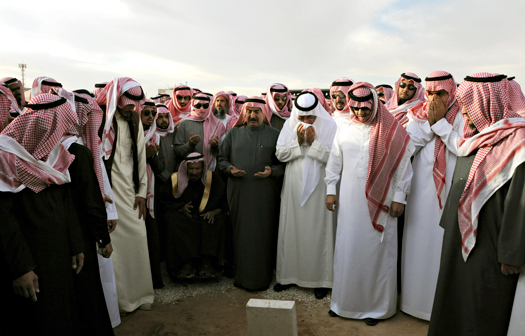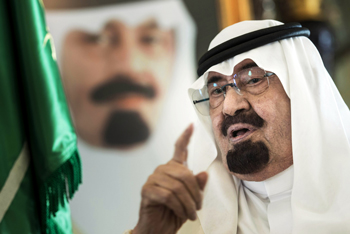The passing of king of Saudi Arabia ushers in new era and new questions
By Brian E. Muhammad -Contributing Writer- | Last updated: Jan 28, 2015 - 4:26:11 PMWhat's your opinion on this article?

In this photo provided by the Saudi Press Agency, relatives of late King Abdullah and other mourners pray after his burial at al-Oud cemetery in Riyadh, Saudi Arabia, Jan. 23.
|
(FinalCall.com) - The custodian of the two holy sites of Islam in Mecca and Medina and the man touted as a reformist who led Saudi Arabia during a decade of regional upheaval and the growth of extremism, has died.
King Abdullah bin Abdulaziz Al Saud, 90-years-old, succumbed to complications of pneumonia and had battled health issues for some time. The world figure was buried in a simple Jan. 23 ceremony within 24 hours of his death in line with Islamic funeral rites.

In this June 27, 2014 file photo, Saudi King Abdullah speaks before a meeting with U.S. Secretary of State John Kerry at his private residence in the Red Sea city of Jiddah, Saudi Arabia. On early, Jan. 23, Saudi state TV reported King Abdullah died at the age of 90. Photos: AP/Wide World photos
|
King Abdullah had ruled since 2005 after the death of his brother King Fahd and was succeeded by his half brother, Crown Prince Salman bin Abdulaziz, 79, former longtime governor of the city of Riyadh and defense minister.
The late king, along with his predecessor King Fahd and successor King Salman, was a son of King Abdulaziz Ibn Saud, who founded modern Saudi Arabia in 1932.
Reaction and condolences poured into the royal family and people of Saudi Arabia from the political and religious worlds.
United States President Barack Obama said, “I always valued King Abdullah’s perspective” and “appreciated our genuine and warm friendship ... the closeness and strength of a partnership between our two countries is part of King Abdullah’s legacy.” The American president is scheduled to visit Saudi Arabia on Jan. 27 to meet the new monarch and pay respects to the royal family and the country.
Iranian President Hassan Rouhani said, “I wish a peaceful rest for the late King, patience for his family and I wish success for the people and the government of Saudi Arabia.”
“King Abdullah left a tangible legacy that can still point the way toward peace in the Middle East,” said United Nations Secretary-General Ban Ki-moon.
“The Saudi kingdom and the Arab nation have lost a leader of its best sons,” added Egyptian President Abdel-Fattah el-Sissi.
Imam Sultan Rahman Muhammad, resident imam of the Nation of Islam, said, “ ‘Surely we are Allah’s and to Him we shall return’ ... We thank Allah (God) for King Abdullah, ‘the reformer,’ for his service as the protector and custodian of the two holiest mosques in Islam, Masjid Al-Haram, the site of the Holy Ka’ba and Madina-tul-Munawara, site of the Prophet’s Mosque, peace be upon him, Masjid al-Nabawi.”
On social media, television and radio, a plethora of thoughts and analysis were expressed about the implications and impact of King Abdullah’s death. Particularly with plunging oil prices and condemnation of the Saudi kingdom on human rights issues, slow civil society, its political alliances with global imperialists like the United States, Britain and France, and accusations of bankrolling opposition groups causing mayhem and instability in other Arab nations like Syria and Yemen.
Notwithstanding the criticism and allegations of corruption levied at the royal family, some lauded King Abdullah as a leader who keenly navigated tough domestic and international issues—oftentimes acting against the status quo of his predecessors.
“Abdullah was known to be fiercely independent and strong as a king,” said Nation of Islam international representative, A. Akbar Muhammad. “Whether Salman can stand up to the same thing and to the Americans remains to be seen.”
King Salman’s first public address emphasized having continuity, confirming widely held expectations that there would not be any serious policy shifts away from King Abdullah.
“He’s sort of been running things for the last few months anyway,” Craig Unger, author of “House of Bush, House of Saud” told The Final Call. However “there’s a need for major reform, and it probably will not take place under him,” said the writer.
The transition comes amid serious economic constraints caused by falling oil prices on the world market that affect the Saudi budget and ability to handle swelling unemployment among youth. Conversely the kingdom owns 16 percent of the world’s proven oil reserves and is the leading exporter of petroleum liquids, according to the U.S. Energy Information Administration. Experts agree that despite the downturn, the Saudis are still poised as the major players in the industry.
In November 2014 the kingdom opted to keep its taps open to force low prices per barrel, which potentially hurts other oil nations like Russia, Iran, Nigeria and Venezuela. It’s the Saudis deliberately flooding the oil markets say some analysts.
“Saudi Arabia should be understood as essentially a client state of the United States,” said New York-based geopolitical analyst Eric Draitser to RT.com. “That client status is not dependent on an individual ruler.”
Mr. Draitser argued Saudi oil strategy of continuing high outflow levels, benefits America’s friction with Russia. “They are draining their own economy for the purposes of being used as a weapon by the United States against Russia.”
“This illustrates quite clearly the degree to which Saudi Arabia is still within the orbit of the United States and that’s not changing,” Mr. Draitser contended.
All indications show the new king isn’t making any moves here and announced Saudi Arabia’s oil minister Ali al-Naimi, 80, who has been driving oil policy since 1995, will keep his job.
Dr. Gerald Horne, professor of history at the University of Houston, anticipates “a certain amount of instability going forward.”
Although King Salman’s ascension appeared to be a “placid process,” palace intrigue and politics makes it “more complicated,” he said.
Questions are circulating about King Salman’s mental capacity to handle the job. There are rumors of serious health challenges and frailty that if correct, “could unleash a battle royal ... amongst the other princes and relatives of the royal family,” Dr. Horne reasoned. “It’s fair to say that Saudi Arabia is a royal mess.”
On Jan. 23 King Salman himself tweeted to the Saudi people: “I ask Allah to make me succeed in serving our dear people and in achieving their wishes, and that He keeps our country and nation safe and stable, and He protect it from all mischief and harm.”
Over live television the new king issued a royal decree naming younger brother and Deputy Crown Prince Muqrin bin Abdulaziz, 69, the new crown prince and his next in line. Then in a sign the next generation of leadership is being positioned, he appointed his 34-year-old son Mohammad bin Salman as defense minister. Observers say the swiftness of the appointments was to calm concerns about potential power struggles in the family.
Meanwhile King Salman faces intense external problems tied to pressing internal problems around sectarianism. Recently Islamic State (ISIS) forces attacked a northern Saudi Arabia/Iraqi border post killing Saudi Brigadier General Awdah al-Balawi, who commanded all northern border forces. One analyst speaking to Reuters said, “It is the first attack by Islamic State itself against Saudi Arabia and is a clear message after Saudi Arabia entered the international coalition against it.”
Bloodshed is sweeping neighboring Yemen. The Saudi backed pro-American government in Yemen collapsed under the guns of a coup d’état by Houthi rebel fighters who have aligned themselves with the Islamic Republic of Iran—the kingdom’s chief rival for regional influence.
Observers say the friction with Iran is exacerbated by marginalization of the kingdom’s Shiite population which is 15 percent of Saudi Arabia. “Iran and the kingdom have an ongoing problem and Iran firmly believes that the Shiites are mistreated and mishandled in the eastern parts of Saudi Arabia,” said Min. Akbar Muhammad.
At the same time the kingdom’s longtime ally America has expressed a desire for normalized relations with Iran. Saudi and U.S. ties date back to the 1930s, when American businessmen travelled there to drill for oil.
“You have to look off more into the future and in that regard you see big issues like whether the United States will reach an agreement with Iran and that’s something the Saudis would hate. The United States has always had one powerful ally in the Middle East and until ’79 it was Iran,” observed Mr. Unger.
The possibility of U.S. détente with Iran is a potential fault line between Saudi Arabia and America. King Abdullah vehemently opposed warm relations with Iran and Mr. Unger foresees King Salman continuing that opposition.
Geopolitics aside, regarding the 1.6 billion Muslims worldwide, King Salman as Custodian of the two Holy Sites of Islam, Min. Akbar Muhammad doesn’t think the leadership change will matter unless there are policy changes affecting the free flow and number of pilgrims traveling to Mecca for Hajj or if some Muslims are mishandled from nations the Saudis are at odds with politically—such as Iran. Muslims will continue to closely watch policy developments concerning Palestine and the Zionist state of Israel, he added.
“I think the Muslim World is going to take a breath and see what happens,” said Min. Akbar Muhammad.
(Brian E. Muhammad can be reached at [email protected].)
INSIDE STORIES AND REVIEWS
-
-
About Harriett ... and the Negro Hollywood Road Show
By Rabiah Muhammad, Guest Columnist » Full Story -
Skepticism greets Jay-Z, NFL talk of inspiring change
By Bryan 18X Crawford and Richard B. Muhammad The Final Call Newspaper @TheFinalCall » Full Story -
The painful problem of Black girls and suicide
By Charlene Muhammad -National Correspondent- » Full Story -
Exploitation of Innocence - Report: Perceptions, policies hurting Black girls
By Charlene Muhammad -National Correspondent- » Full Story -
Big Ballin: Big ideas fuel a father’s Big Baller Brand and brash business sense
By Bryan Crawford -Contributing Writer- » Full Story






 Click Here Stay Connected!
Click Here Stay Connected!








